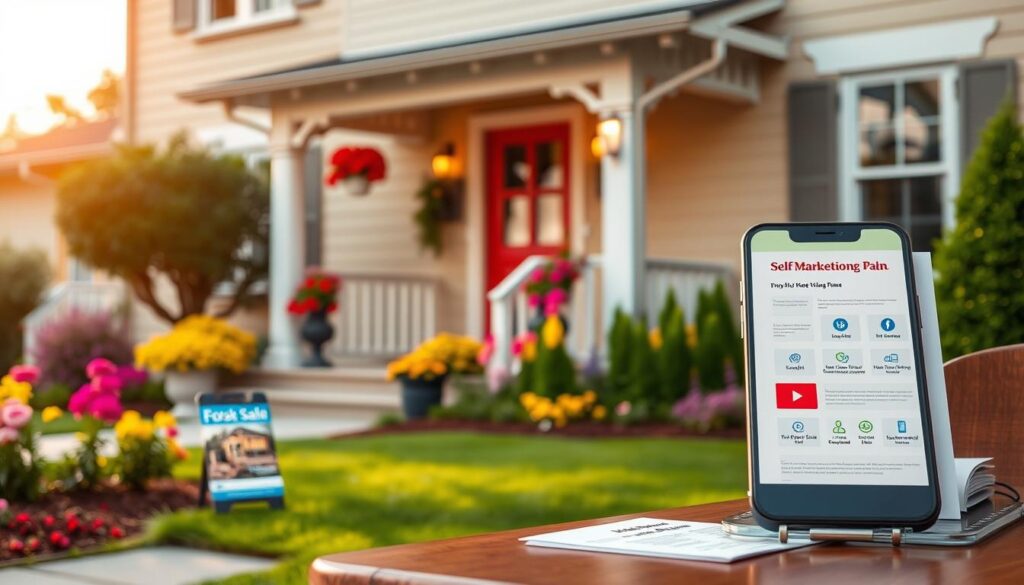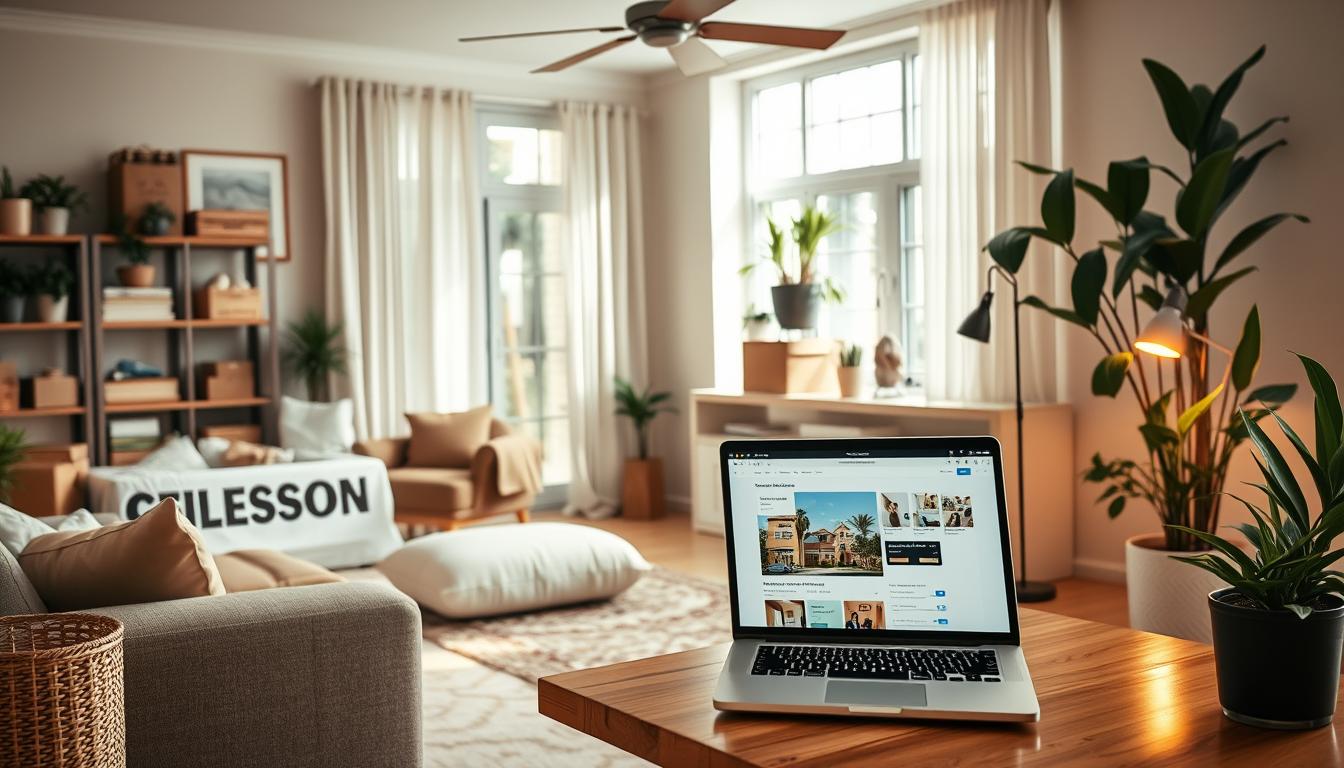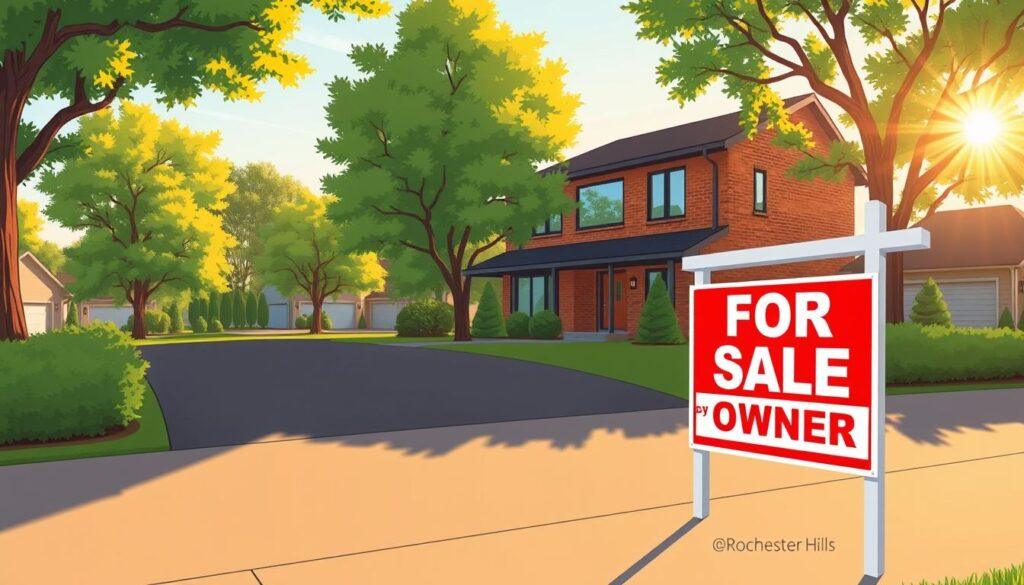Did you know you could save thousands by selling your home yourself? DIY home selling might seem tough, especially with high home prices. But, learning how to sell your house yourself can help you avoid expensive realtor fees. This guide will show you how to sell your house without a realtor, step by step.
We’ll cover the important parts of selling your home on your own. You’ll learn how to get your property ready, set a good price, and market it well. This guide will also talk about the good and bad of selling by yourself. Plus, we’ll share tips on handling offers and negotiations to get the best deal.
Key Takeaways
- Understanding the median home prices and market conditions is crucial for DIY home selling.
- Selling house without realtor can save you significant commission costs.
- Professional staging and high-quality photos enhance online listings and attract buyers.
- Negotiating offers and navigating the closing process is essential for a successful sale.
- Awareness of the time and effort required is necessary when selling house by owner.
Understanding the Basics of Selling Your Home
Selling your home on your own needs a good understanding of the real estate market. Knowing local trends and what buyers want is key to success. The National Association of Realtors (NAR) says only 7% of sellers went the “for sale by owner” (FSBO) route in 2023. This shows how hard it is to sell without an agent’s help.
The market’s ups and downs can affect how long it takes to sell and the price you get. Sellers need to think about these important points:
- Setting a clear timeline for the selling process
- Determining the optimal moment to enter the market
- Understanding legal implications tied to a sale
Those selling on their own should know the basics of the home-selling process. This knowledge helps them control their timeline and approach. Companies offer services to help with FSBO sales, which can save thousands in commissions.
FSBO homes usually sell for less than agent-assisted homes, the NAR says. Closing costs, like title insurance and recording fees, are 6% to 10% of the home’s price. Doing a deep analysis of market data can help sellers deal with these costs.
Getting the price right can lead to quick offers, often in 30-45 days if the price is good. In a seller’s market, with more buyers than homes, prices can go up. This makes selling your home independently more profitable.
Preparing Your House for Sale
Getting your house ready for sale can really help it sell faster and for more money. Many sellers forget how important deep cleaning and decluttering are. These steps are key to making a good first impression.
A clean, organized home lets buyers imagine living there. This makes it easier to sell your house on your own.
Deep Cleaning and Decluttering
Deep cleaning means focusing on all parts of your home, not just what you see. Pay special attention to:
- Carpets and flooring
- Bathrooms and kitchens
- Windows and blinds
- Grout and fixtures
Decluttering makes your home feel bigger. Take down personal items like family photos and favorite decorations. This lets buyers connect with the space. You might need to rent a storage unit for extra furniture.
Making Necessary Repairs and Upgrades
Before you list your home, check for and fix any needed repairs. Look for issues like:
- Water damage
- Broken window seals
- Electrical problems and exposed wiring
- Defective heating and cooling systems
- Cracks in driveways and walkways
Focus on repairs that will give you a good return on investment. Think about updating faucets, bathroom hardware, and fixing broken tiles. A pre-sale inspection can find hidden problems that might scare off buyers.
By focusing on deep cleaning and repairs, you make your home more attractive to buyers. Using these tips can make your house more appealing and valuable during negotiations.
How to Sell Your House Yourself: Setting the Right Price
Finding the right price for your home is key to attracting buyers and selling successfully. To do this, you need to understand the local market and value your property accurately. You can do this by analyzing the market and getting a professional appraisal.
Conducting a Competitive Market Analysis
A competitive market analysis (CMA) is a vital tool for sellers. It involves looking at recent sales, current listings, and market trends. Here are some tips for your CMA:
- Look at homes similar to yours, focusing on size, number of bedrooms, and condition.
- Check the price-to-sale ratios of homes that have sold recently.
- See how long these homes were on the market.
This research helps you price your home right and stay competitive when selling without an agent.
Consulting a Real Estate Appraiser
If you’re unsure about pricing, a real estate appraiser can help. They consider recent sales, market conditions, and your home’s unique features. Although it costs $300-$600, it’s worth it for a fair starting price.
Using a CMA and a professional appraisal can boost your selling chances. Adjusting your price based on these insights can help sell your home faster and get better offers.
Creating an Effective Marketing Strategy
An effective marketing strategy is key to showing your property to potential buyers. Today, having a strong online presence is crucial. About 92% of buyers start their search online, making online platforms vital.
Listing your home on sites like Zillow and Realtor.com boosts visibility. This attracts more people interested in your property.
Utilizing Online Real Estate Platforms
Using online real estate platforms is highly beneficial. A well-made listing with unique features and great photos grabs attention. A professional website builds trust, as 75% of users judge credibility by design.
Update your Google Business Profile to make it easy for buyers to find your property’s details.
Leveraging Social Media and Word of Mouth
Social media is a powerful tool for reaching more people. Use Facebook, Instagram, and LinkedIn to show your listings and connect with buyers. Live tours and Q&A sessions engage viewers well.
Word of mouth is also key. Tell friends and family you’re selling your house. They might share your listing, leading to quicker offers.
Hosting Open Houses for Potential Buyers
Open houses let buyers see your home in person. A clean, well-lit space makes a great impression. Offering refreshments makes the event welcoming, encouraging positive interactions and offers.
Using these strategies can greatly improve selling your home on your own. For more tips on marketing, check out this detailed resource.

Taking High-Quality Photos to Attract Buyers
Good photos are key to making a great first impression of your home. They help your listing stand out in a crowded market. Staging your home for photos means arranging furniture and decor to show off its best features. This creates a welcoming space that buyers will love.
Staging Your Home for Photography
Staging is more than just making your home look good. Here are some tips to help:
- Declutter spaces to create a sense of openness.
- Mix and match furniture arrangements to highlight room functionality.
- Add touches like fresh flowers or vibrant artwork to enhance visual appeal.
Good photos are crucial for connecting with buyers. A 2021 study showed that 89% of buyers find photos most helpful online.
Tips for Capturing Beautiful Images
After staging, focus on the technical details for better photos. Here are some tips:
- Utilize natural lighting by taking photos on clear, sunny days.
- Keep curtains open to allow daylight to illuminate interiors.
- Frame shots carefully, ensuring the best angles showcase your home’s most attractive features.
Professional photos can greatly improve your selling chances. Properties with professional photos sell for more and faster. Professional photography costs $150 to $500, depending on the size and needs. Many sellers find it’s a worthwhile investment for top-notch photos that help sell your home.
Navigating Offers and Negotiations
Once your home is listed, you’ll face the challenge of handling offers. It’s key to know the different types and what they mean for your negotiation. Offers can be contingent, needing the buyer to get financing or sell their home first. Or they can be all-cash, which means a quicker sale. Understanding these can help you see if the buyer is serious and ready to buy.
Understanding Different Types of Offers
There are various offers that can shape your home-selling journey. Here are some main differences:
- Contingent Offers: These depend on certain conditions, like selling another home first. This can make the closing process longer.
- All-Cash Offers: These close faster since they don’t need financing. They offer sellers more security and predictability.
- Bidding Wars: In competitive markets, many buyers might want your home. This can drive up the price, making it higher than the original listing.
Strategies for Successful Negotiation
Good negotiation is key to a good deal. Here are some tips to help you negotiate better:
- Stay Open and Communicative: Answer questions fast and be clear throughout the process.
- Use Counteroffers Wisely: Counteroffers should show what you want. You might ask for a higher price or who pays closing costs.
- Set Expiration Dates: Deadlines on counteroffers can push buyers to make a decision faster.
- Consider Multiple Offers: If you get several, use them to start a bidding war. This can increase your sale price.
- Understand Buyer Contingencies: Knowing about different contingencies can help you negotiate better.
Using these strategies can help you negotiate well. This way, you can get the best deal for your home.
| Type of Offer | Pros | Cons |
|---|---|---|
| Contingent | Possibly higher offers | Longer closing time |
| All-Cash | Faster closing | May be lower offers |
| Bidding War | Higher final sale price | Increased pressure on buyers |
The Importance of a Closing Process
The closing process is key when selling a house without a realtor. It wraps up the deal and makes sure everything is correct. Sellers need to focus on getting all the right documents, like property disclosures and title deeds. Getting these documents early can make the closing smoother.
Gathering Necessary Documentation
Having the right documents is crucial for a smooth closing. You’ll need:
- Purchase agreement
- Deed
- Closing statement
- Mortgage documents
- Title documents
- Proof of insurance
Make sure all your papers are in order to meet local rules. For more info, check out this resource.
Working with a Closing Agent or Attorney
Using a closing agent or attorney makes the legal side easier. They help with the paperwork and know the local laws. They can also help with any legal problems that might come up.
With their help, sellers can feel more confident about the closing. This makes selling a house without a realtor easier.
Alternative Options: Selling to Real Estate Investors
Looking into alternative ways to sell your house can be a smart move. Real estate investors offer a quick and easy solution. They are great for those who need to sell fast without hassle.
The Benefits of a Cash Sale
Cash sales have many perks. They skip the long process of traditional selling. This means no waiting for mortgage approvals or endless negotiations.
Here are some key benefits:
- No realtor commissions, which can be as high as 7%.
- Fast closing times, often within just 10 days.
- Clarity in transactions, reducing the potential for delays.
Avoiding Repairs and Lengthy Processes
Selling to investors also means avoiding costly repairs. Home inspections often reveal issues that need fixing. But, investors usually buy properties as-is, saving you money.
This quick sale process lets you focus on your next steps. Here’s a quick comparison:
| Traditional Selling | Selling to Investors |
|---|---|
| May require costly repairs | Avoids repair costs |
| Average closing time can exceed 30 days | Closes in as little as 10 days |
| Involves realtor commissions | No commission fees |
| Potential delays due to inspections | Offers made as-is |

Choosing to sell to investors is a smart choice. It’s especially helpful for those facing financial troubles or urgent sales needs.
Conclusion
Selling your house yourself can save you a lot of money, especially on broker fees. By using the tips from this guide, you can handle everything from getting ready to sell to negotiating the price. Even though only 7% of homes were sold this way in 2022, you can still have a successful sale.
FSBO homes sold for a median price of $260,000, compared to $318,000 for homes with agents. This means you can keep more of your sale price if you do it yourself. You’ll need to market your home well, take great photos, and set a fair price. This requires good market research and preparation.
When you start selling your house yourself, remember you have options. You can sell directly to investors for quick cash or choose a more traditional route. With hard work and smart planning, selling your house yourself can be very rewarding.






